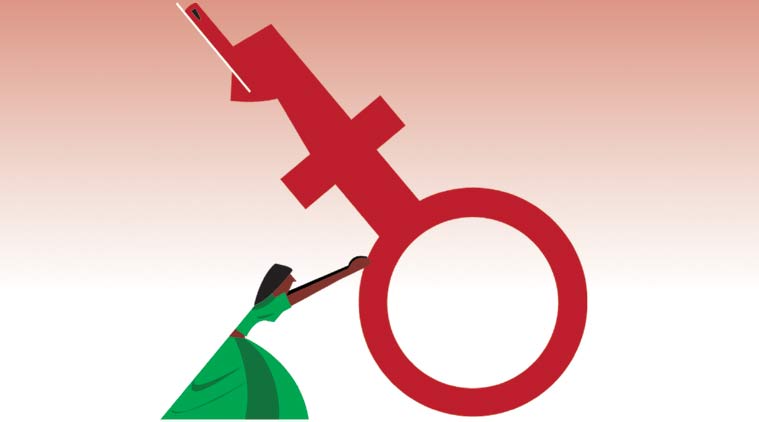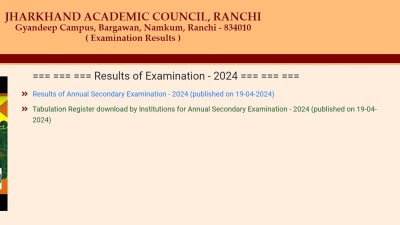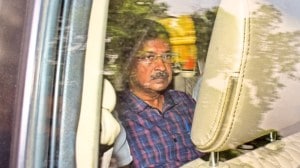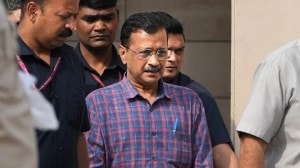- India
- International
The girl from Barabanki
The Barabanki girl conveys the spontaneous confidence that only the very young can feel in a complex political situation. Her truth-telling recalls Gandhi’s scepticism about the state’s ability to protect democracy.
 In the media, colleges and universities, the freedom and space to discuss things without fear of consequences has been shrinking. Why has it not shrunk in a Barabanki school? (Illustration: Pradeep Yadav)
In the media, colleges and universities, the freedom and space to discuss things without fear of consequences has been shrinking. Why has it not shrunk in a Barabanki school? (Illustration: Pradeep Yadav)
Constant humidity makes the air feel heavy in August, but memories too have a lot to do with that feeling. Some of these memories refer to the distant past which, for many, extends back to the Gandhi decades. We who were born after freedom and Partition, learnt about them at school. As usual, the school was quick to give us the news, but took a while to explain it. By that time, our parents’ memories of freedom and Partition had mutated into the nation’s dreams and fantasies.
Whose dreams were they? Not everyone today seems excited about them. Many want to alter the content of those dreams. For instance, the dream of equality does not please a lot of people, including the young. Quite a few of them feel that they have been tricked by the idea of equality. When the reservation policy and minority rights are taught in a school, teachers warn the students that their personal feelings will spoil their marks.
Another dream that irks many is that of a secular India. It is argued sometimes that the term was not part of the original text of the Constitution. Legal debates have clarified that although the term “secular” was inserted during the Emergency, a secular outlook was embedded in the basic structure of the Constitution. However, the debate continues on what it means for India to be secular. Must every Indian be secular or only the state? Some teachers do point out that the idea of a secular state is reflected in all the rights guaranteed in Part III of the Constitution. It forms the edifice of a non-discriminating state.
How keen some of today’s children are to practice these fundamental rights was reflected in a gathering of schoolgirls in Barabanki in Uttar Pradesh. A video showing one of them asking a few questions is a testimony to the effect of mass education. The occasion was a senior-level police officer’s visit to raise awareness about the guarantee of protection available to women. He emphasised the value of their protest when they face threats. After his speech, a Grade XI girl asked him whether a girl’s protest is treated differently when the person threatening her is politically powerful. She cited the Unnao case to show that her doubt is valid. The police officer was apparently speechless. All he could quote was the helpline number.
In the media, colleges and universities, the freedom and space to discuss things without fear of consequences has been shrinking. Why has it not shrunk in a Barabanki school?

There can be several answers to this question. One that I find plausible points to adolescent idealism. It is intact despite the learning crisis some literacy fundamentalists are projecting as a national concern. If you watch the one-minute long Barabanki video, you notice the girl’s awareness of her audience, which includes the visiting officer and her classmates. They applaud when she elaborates on her basic query and uses proper nouns instead of vague indicators. During each applause, you can notice a faint, momentary smile on her face. It disappears when she elaborates on her question in stern Hindi. You are left in no doubt that she is voicing a collective distrust in the police and political power. Equally clearly, you realise that she knows why she is right.
She can be compared to Olga Misik, the 17-year old Russian girl who read aloud the constitution of her country to the riot police in the middle of a demonstration in Moscow last month. Like her, the Barabanki girl — who cannot be named in the prevailing ethos — conveys the spontaneous confidence that only the very young can feel in a complex political situation. Unawareness of the difficulties awaiting them is their strength.
This quality of mind is hardly adequate to sustain the will to assert one’s rights. Nor can it suffice for a whole nation to maintain its progress towards democracy. Its value lies in the solace it offers to adults in a moment of pervasive anxiety. It lightens the load of humid, polluted air pervading our public ethos, promising that Constitutional values do have a future. Apart from the Supreme Court, schools have succeeded in promoting these values despite the many weaknesses of the education system.
The ideals listed in the Preamble and the rights listed in Part III of the Constitution portray an individual in whose character and outlook India was destined to be reborn as a free country. The Barabanki girl fits the portrait. The question she posed to a police officer is essentially Gandhian. It asks him to either acknowledge or to deny the truth. That he does not challenge her is more important than his inability to come up with an answer. His official role puts him in a dilemma. It reminds us of Gandhi’s anticipatory disillusionment with the process of Constitution-making. Having played a massive role in pushing India to freedom, Gandhi had little hope that the state by itself will suffice to protect democracy and civilisation.
Gandhi was deeply sceptical about the state, especially about the power vested in its colonial apparatus. Yet, he and the Constitution have so far served as two key objects of appreciative national consensus. Both are now being subjected to fresh debates. Not everyone appreciated Gandhi’s focus on the village and self-reliance, but no one had so far won an election after praising his murderer. As for the Constitution, it enjoyed a status above religious faith.
As an annual memoir, August reminds us to ask why Gandhi entertained doubts about so many things that we take for granted. He had doubts about the pursuit of material progress for its sake, about the role it might play in choking provinciality and its regenerative vitality. If we look at contemporary life though Gandhi’s window, we can figure out why a schoolgirl who speaks the blunt truth in a small provincial town must now feel scared. That is the news we are receiving. Let us hope that the voice we have heard will survive the passage of adolescence and its idealism.
EXPRESS OPINION
More Explained
Apr 19: Latest News
- 01
- 02
- 03
- 04
- 05









































